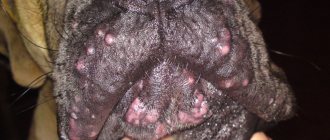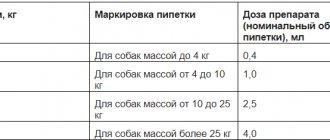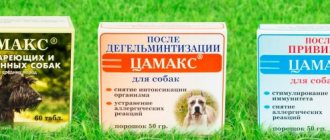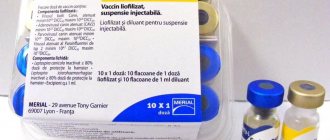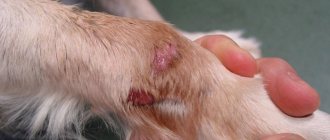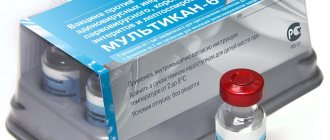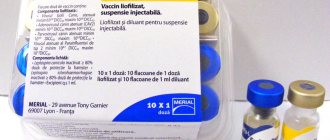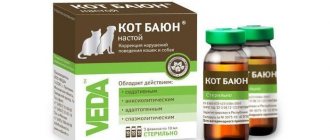In this article I will talk about the use of the drug Giscan-5 in veterinary medicine. I will describe the active substance included in the serum and the form in which it is produced. I will give complete instructions for use for dogs. I will explain in what cases the product is used, how it works, and what side effects it may cause. I will list contraindications for use, existing analogues, the cost of Giscan-5 and its storage conditions.
Giskan-5 is a special serum for animals designed to maintain passive immunity from coronavirus, canine distemper virus, adenovirus and parvovirus.
General data and composition
The drug is produced by Moscow. The trade name of the drug is “Giskan-5”. Serum for dogs (instructions will be presented below) is a slightly opalescent liquid, colored yellow or yellow-brown. A slight sediment may form during storage. If the drug is shaken, it turns into a uniform suspension.
If we talk about the composition, then “Giskan-5” is a biological product made on the basis of blood serum of cattle (or horses and small livestock), which contains certain antibodies - to plague viruses, coronaviruses, adenoviruses and parvoviruses, which are dangerous for dogs.
The drug can be purchased packaged in 2 ml glass bottles, closed with rubber stoppers and secured with aluminum caps. The bottles are packaged in cardboard or plastic boxes of 10 pieces, instructions are included, but they are sold in veterinary pharmacies and individually.
The shelf life of the drug is 2 years from the date of production. The serum should be stored in a dark, dry place at a temperature of 2-10 degrees Celsius.
If foreign objects were found in the serum bottle, or it contains a sediment that does not break down when shaken, then Giskan-5 must be disposed of and this drug cannot be used.
Reviews
Veterinarians
Prokhorov N.V., veterinarian:
Treated many small puppies. Animals often die from exposure to dangerous viruses. Giskan-5 protects pets from plague, enteritis and other infectious diseases. The drug has saved the lives of many animals.
Usmanov L.V. veterinarian:
Serum is an effective remedy in the fight against plague, because it contains antibodies to dangerous viruses. I prescribe the drug to dogs that have been in contact with a sick animal. It should be remembered that the serum is effective in the first 48 hours after infection. Timely contact with a specialist will save the animal’s life.
Owners
Anna, Moscow:
When our dog got distemper, Giskan-5 serum helped. The drug was injected as part of complex therapy. The drug was reintroduced after 14 days for prophylaxis.
Andrey, Volgograd:
The one-month-old pet began to hide in corners, did not play, and did not eat well. The temperature was 39.6°C, the doctor prescribed Giskan-5. On the second day of treatment, the puppy did not get up and ate baby food through a syringe. I was very weak, but after a few days there was a chance of recovery.
Fedor, Novorossiysk:
The pet was 1 month old, began to avoid its owners, hid in a dark room, was very weak, and could not control urination. The veterinarian prescribed Giscan-5 (1 injection every 12 hours for 2 days) and the antibiotic Gentamicin. On the 4th day the dog got up, and a day later she was healthy and cheerful.
"Giskan-5", serum for dogs: instructions
The serum is intended for subcutaneous and intramuscular administration. During the procedure, it is necessary to follow general aseptic rules and use exclusively sterile materials. The same needle should not be used to inject two or more dogs.
It is prohibited to administer the drug to weakened or sick animals suffering from infectious diseases not listed in the list of indications for use of Giscan-5.
Different breeds
The serum is approved for use in any member of the canine family.
If the puppy is taken from the receiver, he is given an injection of Giskan-5 and the injection is repeated a day later. Dogs of any breed should not be bathed after injection. After administration of the serum, the animal is given vitamins and minerals (Catozal).
Caucasian Shepherd Dogs are injected with the Giskan-5 vaccine at the first signs of illness. The Central Asian breed is vaccinated 30 days before mating. The cubs are injected with serum when they are 2 months old.
A French bulldog in poor health is given a drug against plague and enteritis at 1.5 months of age, when the animal loses the immunity received from its mother.
The serum is administered to a 10-day pet after a quarantine period, and revaccination is carried out at 7 months. The medication is prescribed if a bulldog comes into contact with a sick animal.
The American Cocker Spaniel is vaccinated against distemper when it is 8-9 weeks old, and re-vaccinated after 84 days.
For treatment
Giskan-5 (serum for dogs) is also used for the treatment of already sick animals. The instructions suggest in such cases changes in the drug administration regimen. Thus, for sick pets, the drug is administered in the above dosage (up to 5 kg - 1 ml, more than 5 kg - 2 ml) 2-3 times. The interval between injections ranges from 12 to 24 hours, depending on the clinical situation. The exact time period will be determined by the veterinarian. The serum is most effective in the initial stages of the disease.
Indications for use and mechanism of action
Hexane-5 is designed to create and maintain passive immunity in unvaccinated dogs against canine distemper virus, coronavirus, parvovirus and adenovirus.
For medicinal purposes, it is used in the early stages of disease development together with drugs for symptomatic therapy. During the incubation period, the serum has the most effective effect. After administration of the solution, immunity is formed for a period of 2 weeks. This measure allows dogs to more easily tolerate the disease, weakens symptoms, shortens the duration of the disease, and reduces the possibility of subsequent complications after the disease.
For preventive purposes, it is used on unvaccinated dogs during an epidemic and in cases where it is necessary to visit places where dogs that have not been tested for viral diseases gather.
Giscan-5 is not a vaccine.
To vaccinate animals and develop stable immunity to viruses, regular vaccination is necessary.
This drug is suitable for use for preventive purposes on small puppies.
Vaccination is carried out on dogs from the age of 2 months; earlier use is not possible.
If the puppy needs to be transported or visit public places where there is a risk of infection with viruses, until the vaccination can be done, the serum will form the necessary immunity and protect the small pet from infections for a period of up to two weeks. Next, strictly according to schedule, it will be necessary to vaccinate the animal.
A favorable time for its administration is the incubation and prodromal period of the infectious process
Overdose and side effects
No cases of overdose have been identified to date.
Some dogs may experience the following unwanted reactions:
- increased body temperature;
- allergy.
To exclude these reactions, you can administer an antihistamine to your dog 10 minutes before using the serum.
It is allowed to use Giskan-5 together with medications such as antibiotics, sulfonamides, prebiotics and other drugs for symptomatic treatment. It is prohibited to administer the serum in the same syringe with other medications.
How and in what quantities is the drug administered?
To begin with, the dog is weighed to correctly calculate the dosage. Animals weighing less than 5 kg are administered 0.5 doses, which is equal to 1 ml of the drug. Dogs whose weight exceeds 5 kg are injected with 1 dose of GISKAN - 5, that is, 2 ml of serum. The contents of the bottle are thoroughly shaken before giving the injection.
The injection is administered subcutaneously or intramuscularly once for the purpose of prevention. Immunity against viruses will last for at least 14 days, after which the serum can be re-administered or the introduction of a vaccine against a number of infectious diseases can be discussed with a veterinarian.
For the treatment of plague, enteritis and adenovirosis, GISKAN - 5 is administered in 2-3 doses with a 12-24 hour interval in the prescribed doses. If a dog catches the virus, it is advisable to start treatment with GISKAN - 5 as early as possible.
Personal safety
It is necessary to remember about precautions when using the drug "Giskan-5" (serum for dogs). Instructions, price, dosage and side effects have already been discussed above, now let's talk about human safety.
When working with the drug, you should remember the general rules of safety and personal hygiene, developed specifically for those who come into contact with veterinary drugs.
All participants in the drug administration procedure must wear special clothing: hat, robe, rubber gloves, trousers. A first aid kit must be available at the injection site.
If the serum accidentally gets on the mucous membranes or skin, the site of contact with the drug must be washed with running water and laundry soap. If the serum is accidentally administered to a person, the injection site should be immediately treated with 70 percent ethyl alcohol, and then seek medical help. You must take the drug ampoule or instructions with you.
Possible allergens in vaccines
An allergic reaction is an abnormal response of the human body to the introduction of an allergen. Theoretically, any element of the vaccine could be such an allergen. The main component of the composition is the virus protein, and the auxiliary components are the components of the medium on which the vaccine was based, antimicrobial drugs, stabilizers or preservatives.
The most common allergies to vaccine protein are:
- vaccines against hepatitis B, as well as papillomavirus, contain yeast proteins, to which in minor cases a pathological reaction develops. The revealed increased sensitivity to a foreign protein is not a contraindication to the procedure;
- vaccines for influenza, rubella, measles, encephalitis and many others contain chicken egg protein. The development of allergies is minimal. For identified sensitization, a fractional version of the drug is recommended, as well as long-term post-vaccination observation;
- Anti-encephalitis vaccines and anti-rabies drugs contain the protein albumin. The procedure is similar to the above.
Reactions to the components formaldehyde, polyethylene glycol and gelatin are extremely rare.
Serum "Vetbiofarm" "Giskan-5": reviews from animal owners
The drug has a huge number of positive reviews. And both from owners and veterinarians. Both of them claim that the drug is simply irreplaceable. Many owners whose pets contracted the plague or viral diseases while still a puppy are sure that their pets survived only thanks to Giskan-5. Among the main advantages of this drug noted by dog owners is that puppies that cannot yet be vaccinated are allowed to inject it.
Thus, the drug copes with its function perfectly and is suitable even for the smallest pets.
Instructions for use
The pharmaceutical solution Globfel-4 is administered in a dosage depending on the body weight of the animal.
If a veterinarian has prescribed Globfel-4 to immunize a cat, then it is usually administered under the skin of the animal once in a dosage of 1 ml, provided that the body weight of the purr is less than 10 kg. For heavier pets, you will need to inject 2 ml of a pharmaceutical solution. If necessary, the frequency of procedures can be increased to 2-4 times a day. "Vitafel" is used in a similar way.
Immunoglobulin tests if you have allergies
The working units of our immune system are specific protein antibodies, immunoglobulins. They are the first to react to the penetration of foreign biomaterials or allergens into the body. All antibodies are divided into 5 classes.
Immunoglobulin E (IgE) is an important parameter of the humoral immunity, produced by the submucosal layer of body tissue in response to exposure to allergens. He is responsible for the immediate manifestation of an allergic reaction. Additionally, it is involved in the creation of anthelmintic immune defense. Accordingly, an increase or decrease in the level of immunoglobulin E in the blood indicates either an allergic reaction or helminthiasis.
An IgE test is prescribed if:
- bronchial asthma;
- rhinitis of allergic origin;
- atopic dermatitis;
- allergies to food or medications.
The first stage of diagnosis involves searching for a group of allergens that causes sensitization to the patient. The second is identifying individual allergens. An increase in IgE reaction signals the need to avoid contact with the substance, as well as with the product containing it.
Phadia AB is a recognized world leader in the development of in vitro diagnostic systems for allergic and autoimmune diseases. Today, the accurate and stable ImmunoCAP®️ technology is the “gold standard” for allergy diagnostics.
Preparing for the study
Laboratory testing uses the patient's venous blood for analysis. To increase the reliability of the result, it is recommended:
- take blood samples in the morning from 8:00 to 10:00;
- submit material for research on an empty stomach;
- on the eve of the study, reduce physical, sports and emotional stress, eliminate smoking and alcohol.
It is allowed to drink a small amount of clean drinking water without gas.
Data on allergies to domestic coronavirus vaccines
Data on Russian drugs obtained during the mass vaccination campaign:
- “Sputnik V” (vector adenoviral) – no cases of anaphylaxis. The medical product contains polysorbate 80; the instructions for use contain a warning that an allergy to the coronavirus vaccine is possible;
- “EpiVacCorona” (peptide) – no cases of anaphylaxis. Among the components is aluminum hydroxide, which is contraindicated for people with individual selective hypersensitivity, as well as severe allergies;
- CoviVac (inactivated) – no cases of anaphylaxis. The list of contraindications includes severe allergic reactions: anaphylaxis, Quincke's edema, eczema. For non-drug allergies, the drug can be administered.
Head of the Center named after. Gamaleya A. Gunzburg recommends that allergy sufferers, before starting vaccination, carry out tests for C-reactive protein and IgE immunoglobulins, which demonstrate the current risk of complications. A normal level of these indicators will guarantee the safety of vaccination even if there is a history of severe forms of allergies.
Diagnosis of canine distemper
The diagnosis of distemper in an animal is made on the basis of epidemiological data, clinical signs, pathological changes and laboratory test results.
To make a diagnosis based on clinical signs, the veterinarian takes into account the following criteria::
- Damage to the respiratory organs;
- Catarrhal gastroenteritis (inflammation of the mucous membrane of the stomach and intestines)
- Catarrh of the mucous membranes of the eyes and nose with serous or purulent discharge;
- Hyperkeratosis of the paw pads, fingers, nose and entire skin with the formation of a large amount of dandruff;
- Damage to the central nervous system with convulsions, epilepsy, paresis, paralysis, meningitis and meningoencephalitis.
If any four or five of these signs are noticed in a dog, then they indicate the occurrence of distemper. Based on two of the listed signs, a disease can be suspected, and based on three, a clinical diagnosis can be made.
Laboratory diagnostics before vaccination against COVID-19
Immunoglobulin tests are a mandatory examination before vaccination in the presence of drug allergies. The study, as prescribed by a doctor or at your own request, is carried out at the AMC-Medionika clinic in Moscow and is the key to a successful outcome of subsequent immunization. The clinic guarantees:
- reliability of the result;
- speed of obtaining indicators;
- no queues;
- affordable prices for research.
If you wish, you can get advice from an experienced specialist on deciphering the received data. You will be received by highly qualified specialists with many years of experience.
Check your immune status before vaccination to eliminate any risks after vaccination against coronavirus, and make an informed decision about the advisability of vaccination at this stage.
